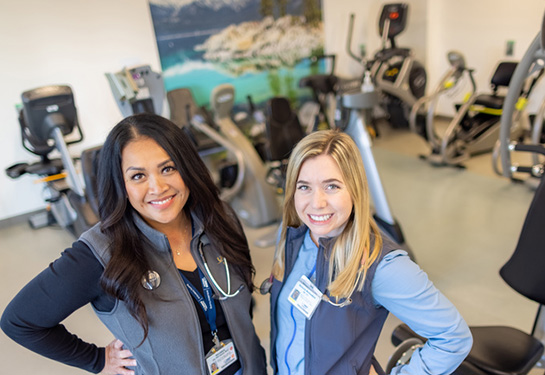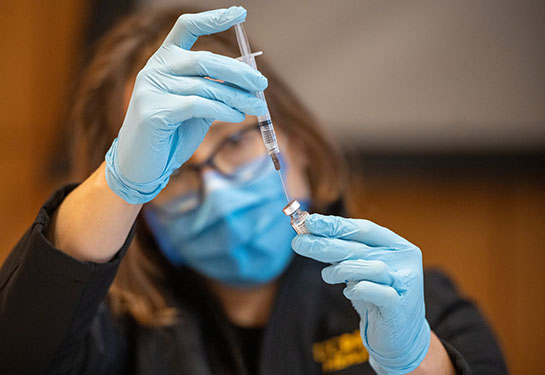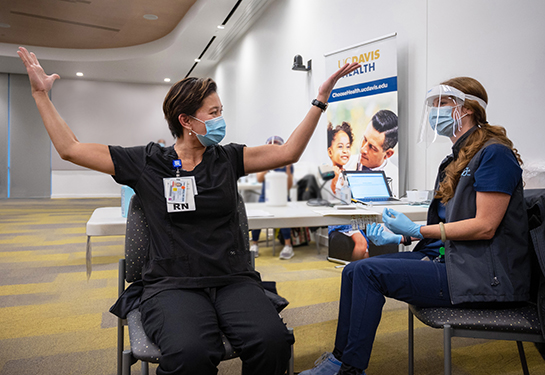Respiratory therapy: Vital to post-COVID-19 recovery
UC Davis Health respiratory therapists working with post-COVID patients to help them return to their pre-COVID lives
Patients recovering from COVID-19 face many obstacles, even once they are free from the virus. Post-acute COVID-19 syndrome (post-COVID) has been described as our “next national health disaster” and the “pandemic after the pandemic,” but for people struggling with post-COVID there are still not many answers.
According to the Centers for Disease Control and Prevention, post-COVID is not a single condition but rather “a wide range of new, returning, or ongoing health problems that people experience after first being infected with the virus that causes COVID-19.”
“Post-COVID is difficult to define because it encompasses a very wide range of symptoms that a wide variety of people with varying degrees of COVID severity experienced,” explained Bradley Sanville, a pulmonary and critical care physician who helped launch UC Davis Health's Post-COVID Clinic.
Post-COVID is estimated to have affected around 16 million working-age adults in the United States. Patients report a wide range of physical and mental health conditions including malaise, fatigue, breathing challenges, cardiovascular abnormalities, migraines, and mental health impairments.
While there is no standard treatment for post-COVID, clinicians have relied on many traditional treatments like pulmonary rehab for patients with trouble breathing or occupational therapy for someone with brain fog to help them return to their pre-COVID lives.
“Some patients are reluctant in the beginning and afraid rehab might cause harm or make their symptoms worse,” Sanville said. “But most have found it helpful. They feel better, and they are often surprised when we push them that they can tolerate more exercise than they thought.”
Pulmonary rehabilitation with post-COVID
Respiratory therapists Veronica Encarnacion and Mallorie Mullendore work with post-COVID patients at UC Davis Health's Pulmonary Rehabilitation Program, which has been supporting patients with post-COVID symptoms since January 2021.
“Many of the post-Covid patients we see are dealing with chronic fatigue,” Mullendore said. “Other lingering issues include dizziness, numbness of the hands and lower extremities, shortness of breath and tachycardia.”
The Pulmonary rehabilitation program at UC Davis Health is accredited by the American Association of Cardiovascular and Pulmonary Rehabilitation. It empowers patients with lung conditions through education, exercise, motivation and support to help improve their quality of life. The multidisciplinary team of specialists provide a wide range of care including a comprehensive evaluation, monitored and supervised exercise, education, psychosocial support and nutritional guidance.
“When the Post-COVID Clinic or a primary care clinician refers a patient to us, it is important we meet with them first and design a rehab program to fit their conditions,” Mullendore explained. “Therapy for post-COVID patients takes more planning because everyone's symptoms are very different. We must be innovative and adaptable based on how a patient is responding to their therapy.”
Exercises and therapies with post-COVID patients include seated exercises with Therabands, weights, cardio and practicing proper breathing techniques. Throughout the exercises, Encarnacion and Mullendore are continuously monitoring their heart rate, oxygen levels and blood pressure.
“It is a slow and long process, but we are seeing these therapies support our post-COVID patients,” Encarnacion said. “We have had many patients begin the rehab process requiring supplemental oxygen and when finishing their eight-week program not needing it anymore. It does provide hope.”
Continuing to provide care
Long-COVID is likely to be with us for some time to come, as COVID-19 is still prevalent. As a result, respiratory therapists in pulmonary rehabilitation programs find that there is a growing patient population in need of their expertise.
“Unfortunately, many of the post-COVID patients we are seeing are a lot younger and people who were relatively healthy before they got Covid-19,” Encarnacion explained.
Encarnacion and Mullendore both believe respiratory therapists will likely play a major role moving forward in treating post-Covid patients. Their knowledge of the respiratory system and clinical expertise in optimizing ventilation via breathing retraining, inhaled medications, secretion clearance (coughing) techniques, volume expansion therapies, and exercises make them an obvious choice to provide treatment and care.
“There is still so much that is unknown about the cause of post-COVID conditions,” said Mullendore. “Until we find a treatment to prevent this condition, we need to continue to work with these patients to provide therapy and help them get back to their pre-COVID lives.”




